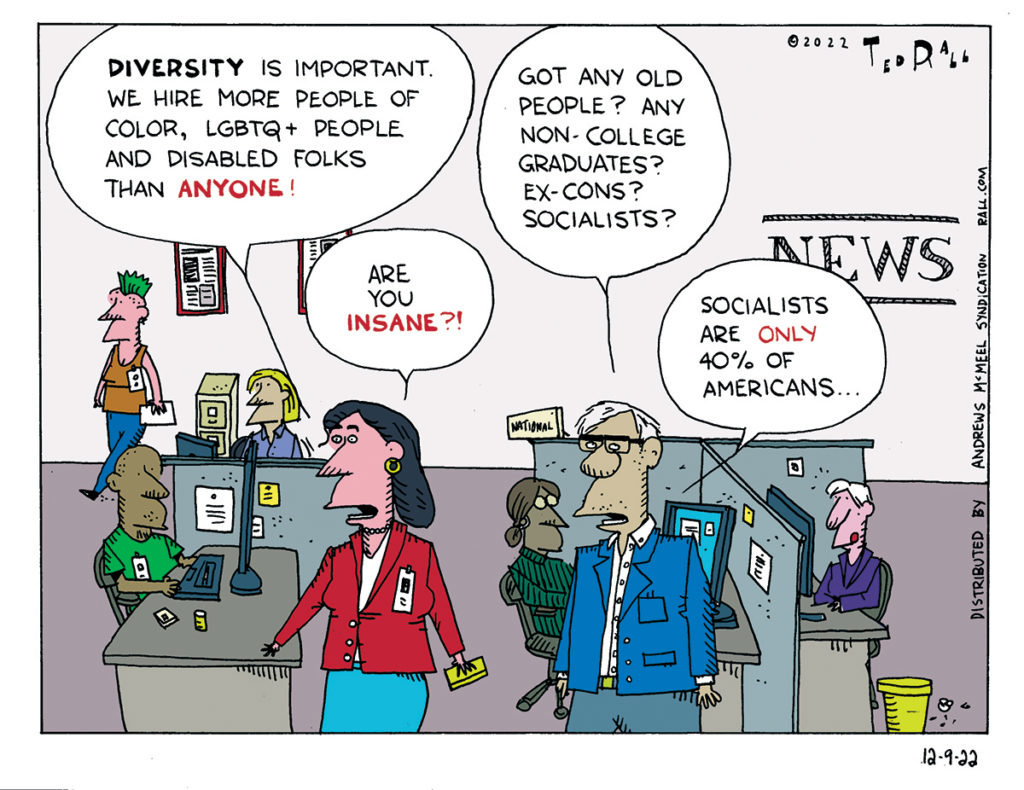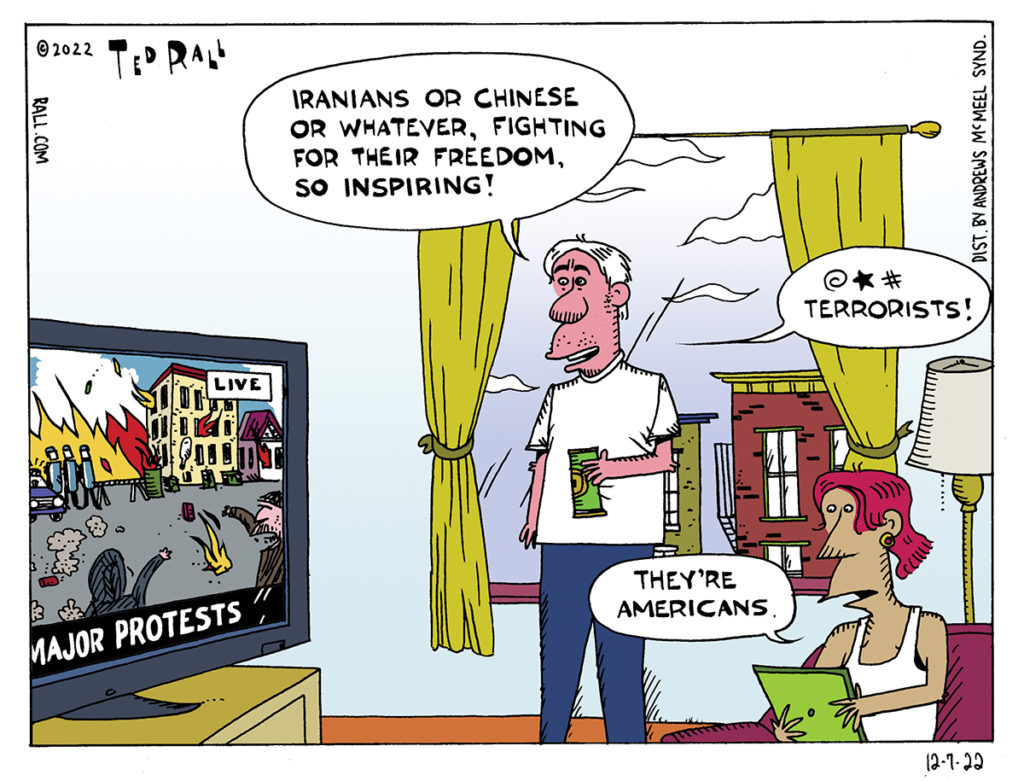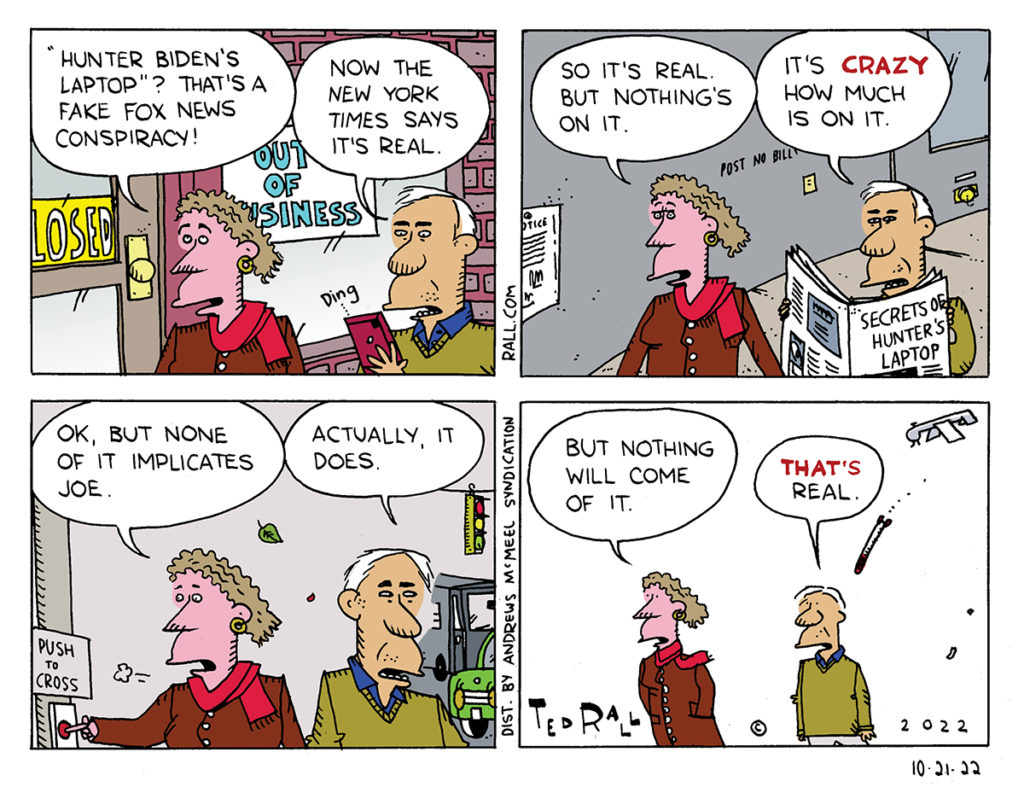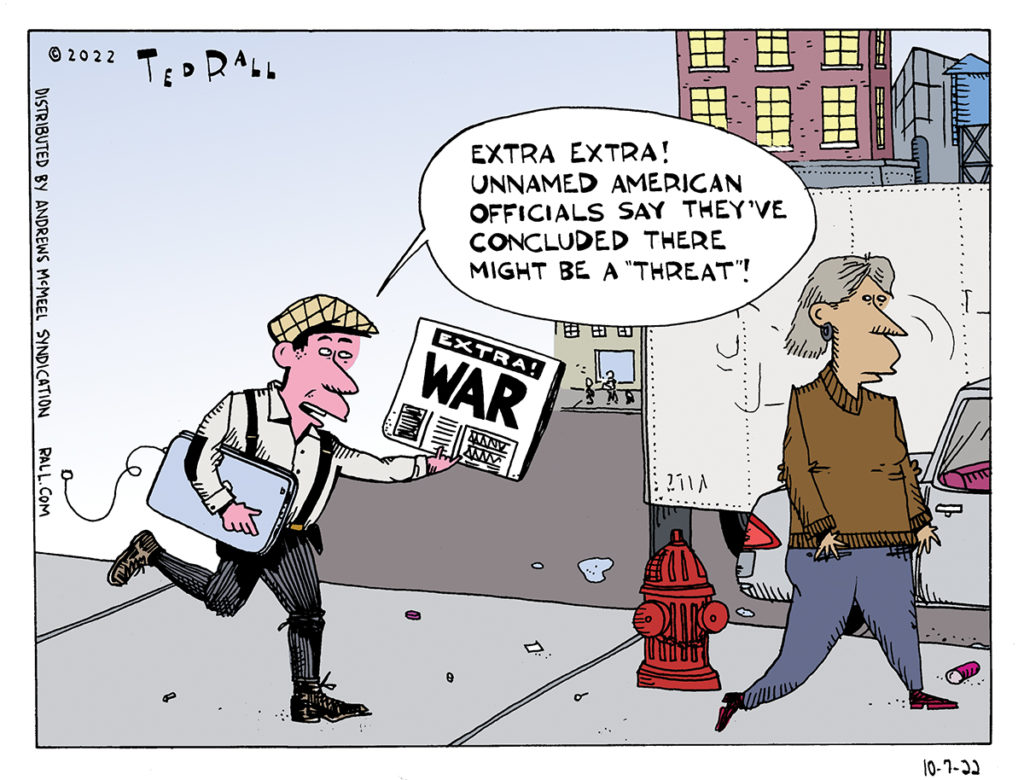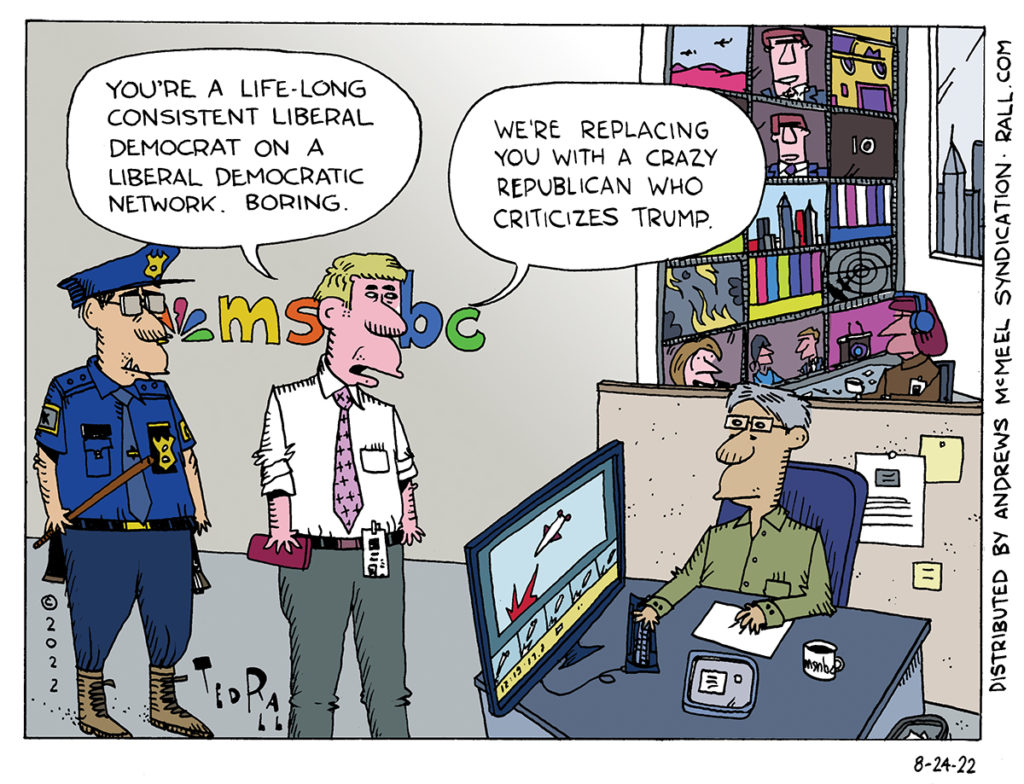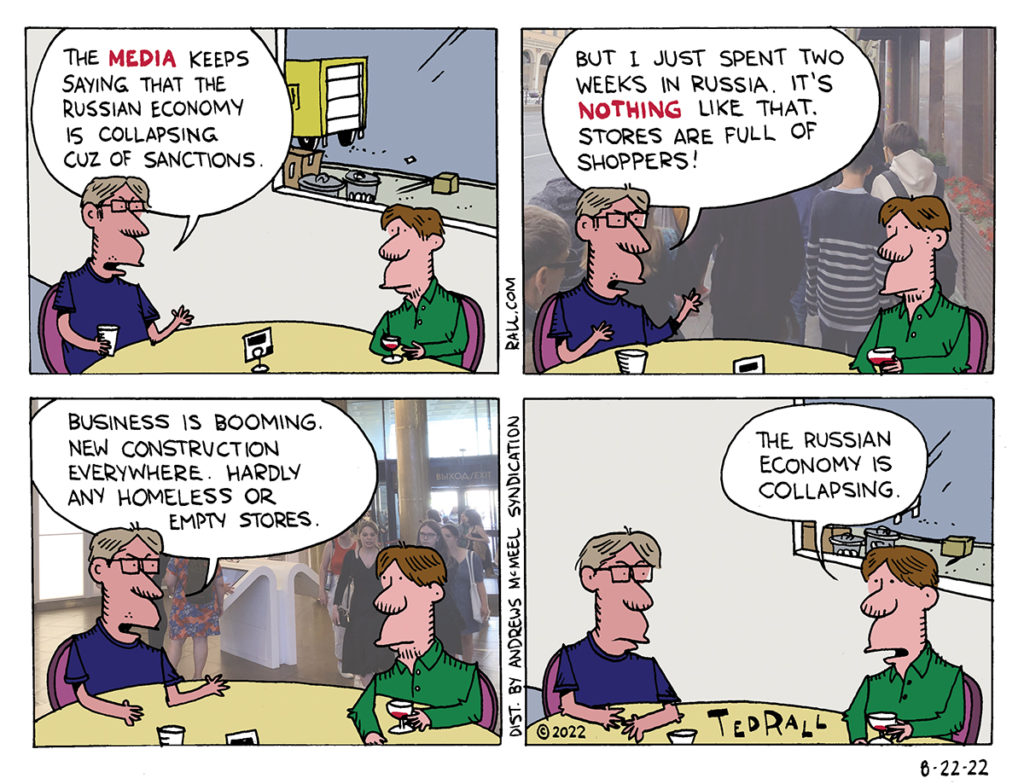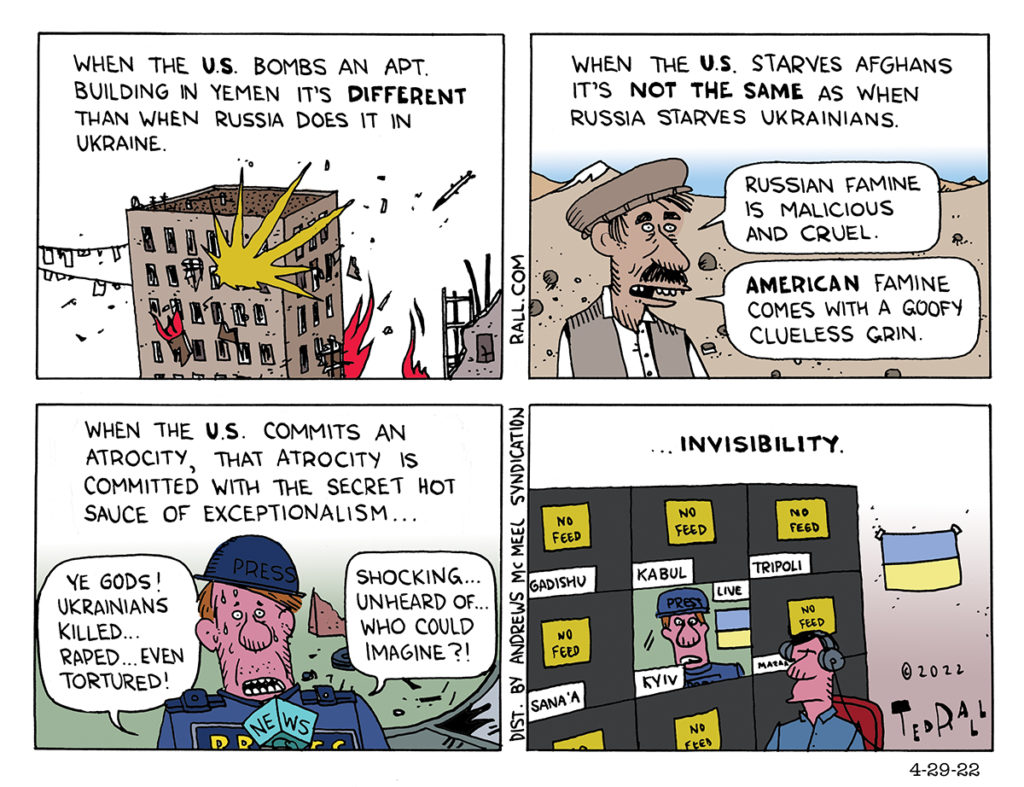Diversity is the word of the day everywhere you look, particularly in employment and in the media. But they only mean certain types of diversity. Anything related to class or politics doesn’t count.
1000 Words and Nothing to Read
Despite official media ethical guidelines that deplore the use of anonymous sources, major national news outlets continue to publish articles leaked by anonymous government officials without any sourcing whatsoever, often purely based on speculation. Unfortunately, it’s not easy to ignore this nonsense.
Trump’s Critics Are Even More Dangerous Than He Is

Edward Luce of the Financial Times recently tweeted one of the most overheated sentences ever uttered in the world of politics: “I’ve covered extremism and violent ideologies around the world over my career. Have never come across a political force more nihilistic, dangerous & contemptible than today’s Republicans. Nothing close.” General Michael Hayden, former director of the CIA and NSA, added: “I agree.” These opinions, and the fact that they are quoted approvingly by Margaret Sullivan in her final column as a media writer for The Washington Post, indicate that Trump Derangement Syndrome is raging at a 106° fever pitch among Democratic elites.
Luce’s remark is pure madness. No one will out-disdain me when it comes to the GOP but only a lunatic would argue they’re more “nihilistic, dangerous and contemptible” than the Khmer Rouge, the Rwandan Hutu-led government of Théoneste Bagosora, Al Qaeda, ISIS or Saudi Arabia. It’s depressingly revealing to watch that someone who so clearly ought to and probably does know better like Sullivan, who earned praise for her courageous run as ombudsman at The New York Times, regurgitate such ahistorical nonsense and turn to a man like Hayden—who for years presided over the exquisitely illegal effort to collect and store every communication between every individual and organization on Earth—for his opinions on democracy.
(Disclosure: After some initially-promising email exchanges about the possibility that she and the Post might look into the Los Angeles Times’ decision to fire and smear me as a favor to the LAPD, Sullivan ghosted me.)
There is nothing wrong with sounding the alarm about Donald Trump. But democratic institutions face a far bigger threat than the former and possibly future president: the argument, repeated incessantly across multiple platforms by boldfaced media and political personalities, that Trump is especially dangerous, that he lied/lies more than other politicians, that his politics are exceptionally extreme…that he is somehow unique.
The standard argument that, as Post columnist Jennifer Rubin put it in her 2017 screed, that “[Trump] is Not a Normal President,” invites the American public to buy into three assumptions:
- Other presidents and politicians tell fewer lies—a lot fewer—than Trump.
- Nothing was fundamentally wrong with the United States or its political system before Trump came along.
- Get rid of Trump and everything will be fine.
Certainly, Trump and his presidency were unusual in some respects. He’s the only man to have won the White House without having held political office or served in the military. He eschewed prepared speeches. His campaign ran on a shoestring budget without a national organization. He expressed the willingness to talk to enemies and adversaries without preconditions. He continued to hold campaign rallies during his presidency. But the media hype is a lie. In the ways that matter most in a presidency—policy and tone—Donald Trump was/is anything but anomalous.
Yes, Trump refused to concede the 2020 election. George W. Bush refused to concede the 2000 election.
Trump’s goons resorted to violence to try to overturn an election. So did Bush’s.
Trump tried to steal an election. Bush succeeded.
Trump wallowed in racist dog whistles. So did Ronald Reagan and George H.W. Bush.
Trump’s cabinet was full of underqualified nuts. So was Reagan’s and Bush’s.
The first step is admitting that you have a problem. American democracy has big problems. But neither the media nor the political class nor the voters are willing to acknowledge them—so there’s no chance we’ll fix them.
Not only are we in denial about the systematic flaws baked into our political system—two parties that conspire to keep smaller parties off the ballot, the inherently corrupting influence of capitalism on democracy, the electoral college and the revolving door between business, media and politics—we’re deluding ourselves into believing that Donald Trump is the problem.
Trump isn’t the problem. He’s a symptom.
The duopoly gave us Trump when the DNC kneecapped his strongest Democratic primary challenger, Bernie Sanders, in favor of Hillary Clinton. The cult of money convinced voters that his wealth qualified him for office. The electoral college gave him the White House even though he got fewer votes.
Those who obsess over Trump are far more dangerous than he is. Trump is old and fat and, before long, will no longer be with us. The issues we’re ignoring while we’re distracted by Trump will afflict us for years to come.
As will the idiots who won’t shut up about Trump.
(Ted Rall (Twitter: @tedrall), the political cartoonist, columnist and graphic novelist, co-hosts the left-vs-right DMZ America podcast with fellow cartoonist Scott Stantis. You can support Ted’s hard-hitting political cartoons and columns and see his work first by sponsoring his work on Patreon.
Trump and Biden are Both Liars. Only Trump Gets Called Out.

The following phrase, and its variants, has become ubiquitous: “Donald Trump’s baseless charges of election fraud.” Mainstream news outlets have accelerated its use during the congressional hearings on the January 6th Capitol riot.
The phrase is accurate. Though historically American elections have been marred by fraud and outright subversion, no evidence has surfaced to suggest that any such improprieties occurred during the 2020 presidential election that were substantial enough to change the result. As far as we know, Joe Biden was legitimately elected.
But is it journalistically kosher?
Fairness, accuracy and integrity are the core of journalistic ethics. Those values are compromised when they are applied inconsistently, as do American news companies.
Republicans, conservatives and supporters of former President Donald Trump in particular have long complained that corporate media outlets have been harder on him than on other politicians or previous presidents. It’s hard to disagree. Journalists’ labeling of Trump’s allegations that the 2020 election was stolen as a lie is a case in point; it’s impossible to think of another American politician who has been so repeatedly editorialized against in non-opinion news stories or to have his claims — no matter how untrue — repeatedly denied in headlines.
Biden and fellow Democrats, for example, have taken to calling high gas prices “Putin’s gas hike.” This is just as false as Trump’s election BS. The Wall Street Journal notes that gas prices were “turbocharged by a rebounding economy after a pandemic-induced slowdown” well before Russia invaded Ukraine. Anti-Russian sanctions imposed by the West, led by the U.S., exacerbated the problem. Whether or not Joe Biden is responsible for $5 gas, no one can credibly blame Vladimir Putin for the effects of sanctions he imposed against Vladimir Putin.
You won’t see headlines describing Biden’s spin on gas prices as “baseless” or “false.” As they do when any politician other than Donald Trump lies, the press acts as stenographers, dutifully passing on communiqués regardless of their truthiness. “Biden blames Russia for gas prices,” reports The Politico. “Biden slams ‘Putin’s price hike,’” says CNN. Calling out Trump for lying is great. Doing so is a reporter’s job. Why not Biden?
Willful inconsistency is the hallmark of how reporting becomes propaganda in the 21st century. As coverage of the January 6th hearings keeps reminding us, Donald Trump tried to steal the presidency. The same reporters had little to nothing to say about George W. Bush actually stealing the presidency; because Bush hates Trump, they treat the architect of torture, drones and Gitmo like an elder statesman. When the United States invades a foreign country there’s almost no attempt to humanize civilian victims but when the invading army belongs to a U.S. adversary coverage of the human cost – even the cost to animals — is exhaustive.
The facile defense to this critique is that reporters are setting the record straight when they label Trump’s lies as such. Trouble is, there are so many lies being told by so many politicians of every conceivable ideological orientation that limiting factchecks to one individual, even a former president and possible future one for whom the truth appears to be a mortal enemy, looks exactly like what it is: choosing sides by giving your fellow partisans a free pass. Further, because the press’ anti-Trump bias is so over-the-top, there is a natural tendency to dismiss it.
I’m not arguing that journalists should stop writing that Donald Trump is a liar. To the contrary, holding politicians accountable for untruths is long overdue. I’m saying they should do the same thing to other politicians as well.
Now that Russiagate has been thoroughly debunked, it would be nice to see news media say so. Instead of “US is worried about Russia using new efforts to exploit divisions in 2022 midterms,” CNN could say “US officials revive discredited claims on election ‘interference.’”
Instead of “Iraq War role was a stain on Powell’s record — one he openly said he regretted,” The Washington Post could say: “A million dead Iraqis later, Powell regretted lying America into Iraq War.”
Surely the courageous journalists who call out “Trump’s election lie” for what it is can present other stories in an equally straightforward manner. ABC’s “Slain journalist Jamal Khashoggi’s fiancee condemns Biden’s upcoming trip to Saudi Arabia” ought to be specific. After all, Khashoggi wasn’t passive-tense “slain.” In one of the most insane political assassinations in modern history, Khashoggi was viciously butchered in the Saudi consulate at the order of the Saudi crown prince. Biden isn’t merely going to Saudi Arabia, he’s planning to meet and shake hands with Khashoggi’s murderer. How about: “Fiancee of Jamal Khashoggi condemns Biden for upcoming visit with journalist’s murderer”?
(Ted Rall (Twitter: @tedrall), the political cartoonist, columnist and graphic novelist, is the author of a new graphic novel about a journalist gone bad, “The Stringer.” Order one today. You can support Ted’s hard-hitting political cartoons and columns and see his work first by sponsoring his work on Patreon.)
The Secret Sauce of American Exceptionalism
Nothing that Russia is doing in Ukraine is something that the United States has done many times elsewhere over the years. But there’s a big difference in the way that these events get covered. When the US does something horrible, it is dismissed as an incongruous departure from standard American values or simply not covered at all.
Why Are We in so Deep for Ukraine?
The people of Afghanistan, Iraq, Syria, Libya and many other countries destroyed by US military forces never enjoyed the sympathetic media coverage, much less the humanization, that Ukrainians are getting during the Russian invasion. To the contrary, Afghan patriots who shot at American forces were portrayed as terrorists and enemy combatants. Why the difference?

